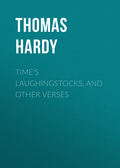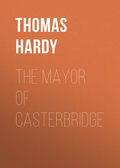
Томас Харди (Гарди)
Wessex Tales
‘What a man can it be?’ said the shepherd.
The rest, between the awfulness of their late discovery and the odd conduct of this third visitor, looked as if they knew not what to think, and said nothing. Instinctively they withdrew further and further from the grim gentleman in their midst, whom some of them seemed to take for the Prince of Darkness himself; till they formed a remote circle, an empty space of floor being left between them and him -
‘.. circulus, cujus centrum diabolus.’
The room was so silent – though there were more than twenty people in it – that nothing could be heard but the patter of the rain against the window-shutters, accompanied by the occasional hiss of a stray drop that fell down the chimney into the fire, and the steady puffing of the man in the corner, who had now resumed his pipe of long clay.
The stillness was unexpectedly broken. The distant sound of a gun reverberated through the air – apparently from the direction of the county-town.
‘Be jiggered!’ cried the stranger who had sung the song, jumping up.
‘What does that mean?’ asked several.
‘A prisoner escaped from the jail – that’s what it means.’
All listened. The sound was repeated, and none of them spoke but the man in the chimney-corner, who said quietly, ‘I’ve often been told that in this county they fire a gun at such times; but I never heard it till now.’
‘I wonder if it is my man?’ murmured the personage in cinder-gray.
‘Surely it is!’ said the shepherd involuntarily. ‘And surely we’ve zeed him! That little man who looked in at the door by now, and quivered like a leaf when he zeed ye and heard your song!’
‘His teeth chattered, and the breath went out of his body,’ said the dairyman.
‘And his heart seemed to sink within him like a stone,’ said Oliver Giles.
‘And he bolted as if he’d been shot at,’ said the hedge-carpenter.
‘True – his teeth chattered, and his heart seemed to sink; and he bolted as if he’d been shot at,’ slowly summed up the man in the chimney-corner.
‘I didn’t notice it,’ remarked the hangman.
‘We were all a-wondering what made him run off in such a fright,’ faltered one of the women against the wall, ‘and now ’tis explained!’
The firing of the alarm-gun went on at intervals, low and sullenly, and their suspicions became a certainty. The sinister gentleman in cinder-gray roused himself. ‘Is there a constable here?’ he asked, in thick tones. ‘If so, let him step forward.’
The engaged man of fifty stepped quavering out from the wall, his betrothed beginning to sob on the back of the chair.
‘You are a sworn constable?’
‘I be, sir.’
‘Then pursue the criminal at once, with assistance, and bring him back here. He can’t have gone far.’
‘I will, sir, I will – when I’ve got my staff. I’ll go home and get it, and come sharp here, and start in a body.’
‘Staff! – never mind your staff; the man’ll be gone!’
‘But I can’t do nothing without my staff – can I, William, and John, and Charles Jake? No; for there’s the king’s royal crown a painted on en in yaller and gold, and the lion and the unicorn, so as when I raise en up and hit my prisoner, ’tis made a lawful blow thereby. I wouldn’t ‘tempt to take up a man without my staff – no, not I. If I hadn’t the law to gie me courage, why, instead o’ my taking up him he might take up me!’
‘Now, I’m a king’s man myself; and can give you authority enough for this,’ said the formidable officer in gray. ‘Now then, all of ye, be ready. Have ye any lanterns?’
‘Yes – have ye any lanterns? – I demand it!’ said the constable.
‘And the rest of you able-bodied – ’
‘Able-bodied men – yes – the rest of ye!’ said the constable.
‘Have you some good stout staves and pitch-forks – ’
‘Staves and pitchforks – in the name o’ the law! And take ’em in yer hands and go in quest, and do as we in authority tell ye!’
Thus aroused, the men prepared to give chase. The evidence was, indeed, though circumstantial, so convincing, that but little argument was needed to show the shepherd’s guests that after what they had seen it would look very much like connivance if they did not instantly pursue the unhappy third stranger, who could not as yet have gone more than a few hundred yards over such uneven country.
A shepherd is always well provided with lanterns; and, lighting these hastily, and with hurdle-staves in their hands, they poured out of the door, taking a direction along the crest of the hill, away from the town, the rain having fortunately a little abated.
Disturbed by the noise, or possibly by unpleasant dreams of her baptism, the child who had been christened began to cry heart-brokenly in the room overhead. These notes of grief came down through the chinks of the floor to the ears of the women below, who jumped up one by one, and seemed glad of the excuse to ascend and comfort the baby, for the incidents of the last half-hour greatly oppressed them. Thus in the space of two or three minutes the room on the ground-floor was deserted quite.
But it was not for long. Hardly had the sound of footsteps died away when a man returned round the corner of the house from the direction the pursuers had taken. Peeping in at the door, and seeing nobody there, he entered leisurely. It was the stranger of the chimney-corner, who had gone out with the rest. The motive of his return was shown by his helping himself to a cut piece of skimmer-cake that lay on a ledge beside where he had sat, and which he had apparently forgotten to take with him. He also poured out half a cup more mead from the quantity that remained, ravenously eating and drinking these as he stood. He had not finished when another figure came in just as quietly – his friend in cinder-gray.
‘O – you here?’ said the latter, smiling. ‘I thought you had gone to help in the capture.’ And this speaker also revealed the object of his return by looking solicitously round for the fascinating mug of old mead.
‘And I thought you had gone,’ said the other, continuing his skimmer-cake with some effort.
‘Well, on second thoughts, I felt there were enough without me,’ said the first confidentially, ‘and such a night as it is, too. Besides, ’tis the business o’ the Government to take care of its criminals – not mine.’
‘True; so it is. And I felt as you did, that there were enough without me.’
‘I don’t want to break my limbs running over the humps and hollows of this wild country.’
‘Nor I neither, between you and me.’
‘These shepherd-people are used to it – simple-minded souls, you know, stirred up to anything in a moment. They’ll have him ready for me before the morning, and no trouble to me at all.’
‘They’ll have him, and we shall have saved ourselves all labour in the matter.’
‘True, true. Well, my way is to Casterbridge; and ’tis as much as my legs will do to take me that far. Going the same way?’
‘No, I am sorry to say! I have to get home over there’ (he nodded indefinitely to the right), ‘and I feel as you do, that it is quite enough for my legs to do before bedtime.’
The other had by this time finished the mead in the mug, after which, shaking hands heartily at the door, and wishing each other well, they went their several ways.
In the meantime the company of pursuers had reached the end of the hog’s-back elevation which dominated this part of the down. They had decided on no particular plan of action; and, finding that the man of the baleful trade was no longer in their company, they seemed quite unable to form any such plan now. They descended in all directions down the hill, and straightway several of the party fell into the snare set by Nature for all misguided midnight ramblers over this part of the cretaceous formation. The ‘lanchets,’ or flint slopes, which belted the escarpment at intervals of a dozen yards, took the less cautious ones unawares, and losing their footing on the rubbly steep they slid sharply downwards, the lanterns rolling from their hands to the bottom, and there lying on their sides till the horn was scorched through.
When they had again gathered themselves together, the shepherd, as the man who knew the country best, took the lead, and guided them round these treacherous inclines. The lanterns, which seemed rather to dazzle their eyes and warn the fugitive than to assist them in the exploration, were extinguished, due silence was observed; and in this more rational order they plunged into the vale. It was a grassy, briery, moist defile, affording some shelter to any person who had sought it; but the party perambulated it in vain, and ascended on the other side. Here they wandered apart, and after an interval closed together again to report progress.
At the second time of closing in they found themselves near a lonely ash, the single tree on this part of the coomb, probably sown there by a passing bird some fifty years before. And here, standing a little to one side of the trunk, as motionless as the trunk itself; appeared the man they were in quest of; his outline being well defined against the sky beyond. The band noiselessly drew up and faced him.
‘Your money or your life!’ said the constable sternly to the still figure.
‘No, no,’ whispered John Pitcher. ‘’Tisn’t our side ought to say that. That’s the doctrine of vagabonds like him, and we be on the side of the law.’
‘Well, well,’ replied the constable impatiently; ‘I must say something, mustn’t I? and if you had all the weight o’ this undertaking upon your mind, perhaps you’d say the wrong thing too! – Prisoner at the bar, surrender, in the name of the Father – the Crown, I mane!’
The man under the tree seemed now to notice them for the first time, and, giving them no opportunity whatever for exhibiting their courage, he strolled slowly towards them. He was, indeed, the little man, the third stranger; but his trepidation had in a great measure gone.
‘Well, travellers,’ he said, ‘did I hear ye speak to me?’
‘You did: you’ve got to come and be our prisoner at once!’ said the constable. ‘We arrest ‘ee on the charge of not biding in Casterbridge jail in a decent proper manner to be hung to-morrow morning. Neighbours, do your duty, and seize the culpet!’
On hearing the charge, the man seemed enlightened, and, saying not another word, resigned himself with preternatural civility to the search-party, who, with their staves in their hands, surrounded him on all sides, and marched him back towards the shepherd’s cottage.
It was eleven o’clock by the time they arrived. The light shining from the open door, a sound of men’s voices within, proclaimed to them as they approached the house that some new events had arisen in their absence. On entering they discovered the shepherd’s living room to be invaded by two officers from Casterbridge jail, and a well-known magistrate who lived at the nearest country-seat, intelligence of the escape having become generally circulated.
‘Gentlemen,’ said the constable, ‘I have brought back your man – not without risk and danger; but every one must do his duty! He is inside this circle of able-bodied persons, who have lent me useful aid, considering their ignorance of Crown work. Men, bring forward your prisoner!’ And the third stranger was led to the light.
‘Who is this?’ said one of the officials.
‘The man,’ said the constable.
‘Certainly not,’ said the turnkey; and the first corroborated his statement.
‘But how can it be otherwise?’ asked the constable. ‘Or why was he so terrified at sight o’ the singing instrument of the law who sat there?’ Here he related the strange behaviour of the third stranger on entering the house during the hangman’s song.
‘Can’t understand it,’ said the officer coolly. ‘All I know is that it is not the condemned man. He’s quite a different character from this one; a gauntish fellow, with dark hair and eyes, rather good-looking, and with a musical bass voice that if you heard it once you’d never mistake as long as you lived.’
‘Why, souls – ’twas the man in the chimney-corner!’
‘Hey – what?’ said the magistrate, coming forward after inquiring particulars from the shepherd in the background. ‘Haven’t you got the man after all?’
‘Well, sir,’ said the constable, ‘he’s the man we were in search of, that’s true; and yet he’s not the man we were in search of. For the man we were in search of was not the man we wanted, sir, if you understand my everyday way; for ’twas the man in the chimney-corner!’
‘A pretty kettle of fish altogether!’ said the magistrate. ‘You had better start for the other man at once.’
The prisoner now spoke for the first time. The mention of the man in the chimney-corner seemed to have moved him as nothing else could do. ‘Sir,’ he said, stepping forward to the magistrate, ‘take no more trouble about me. The time is come when I may as well speak. I have done nothing; my crime is that the condemned man is my brother. Early this afternoon I left home at Shottsford to tramp it all the way to Casterbridge jail to bid him farewell. I was benighted, and called here to rest and ask the way. When I opened the door I saw before me the very man, my brother, that I thought to see in the condemned cell at Casterbridge. He was in this chimney-corner; and jammed close to him, so that he could not have got out if he had tried, was the executioner who’d come to take his life, singing a song about it and not knowing that it was his victim who was close by, joining in to save appearances. My brother looked a glance of agony at me, and I knew he meant, “Don’t reveal what you see; my life depends on it.” I was so terror-struck that I could hardly stand, and, not knowing what I did, I turned and hurried away.’
The narrator’s manner and tone had the stamp of truth, and his story made a great impression on all around. ‘And do you know where your brother is at the present time?’ asked the magistrate.
‘I do not. I have never seen him since I closed this door.’
‘I can testify to that, for we’ve been between ye ever since,’ said the constable.
‘Where does he think to fly to? – what is his occupation?’
‘He’s a watch-and-clock-maker, sir.’
‘’A said ’a was a wheelwright – a wicked rogue,’ said the constable.
‘The wheels of clocks and watches he meant, no doubt,’ said Shepherd Fennel. ‘I thought his hands were palish for’s trade.’
‘Well, it appears to me that nothing can be gained by retaining this poor man in custody,’ said the magistrate; ‘your business lies with the other, unquestionably.’
And so the little man was released off-hand; but he looked nothing the less sad on that account, it being beyond the power of magistrate or constable to raze out the written troubles in his brain, for they concerned another whom he regarded with more solicitude than himself. When this was done, and the man had gone his way, the night was found to be so far advanced that it was deemed useless to renew the search before the next morning.
Next day, accordingly, the quest for the clever sheep-stealer became general and keen, to all appearance at least. But the intended punishment was cruelly disproportioned to the transgression, and the sympathy of a great many country-folk in that district was strongly on the side of the fugitive. Moreover, his marvellous coolness and daring in hob-and-nobbing with the hangman, under the unprecedented circumstances of the shepherd’s party, won their admiration. So that it may be questioned if all those who ostensibly made themselves so busy in exploring woods and fields and lanes were quite so thorough when it came to the private examination of their own lofts and outhouses. Stories were afloat of a mysterious figure being occasionally seen in some old overgrown trackway or other, remote from turnpike roads; but when a search was instituted in any of these suspected quarters nobody was found. Thus the days and weeks passed without tidings.
In brief; the bass-voiced man of the chimney-corner was never recaptured. Some said that he went across the sea, others that he did not, but buried himself in the depths of a populous city. At any rate, the gentleman in cinder-gray never did his morning’s work at Casterbridge, nor met anywhere at all, for business purposes, the genial comrade with whom he had passed an hour of relaxation in the lonely house on the coomb.
The grass has long been green on the graves of Shepherd Fennel and his frugal wife; the guests who made up the christening party have mainly followed their entertainers to the tomb; the baby in whose honour they all had met is a matron in the sere and yellow leaf. But the arrival of the three strangers at the shepherd’s that night, and the details connected therewith, is a story as well known as ever in the country about Higher Crowstairs.
March 1883.
THE WITHERED ARM
CHAPTER I – A LORN MILKMAID
It was an eighty-cow dairy, and the troop of milkers, regular and supernumerary, were all at work; for, though the time of year was as yet but early April, the feed lay entirely in water-meadows, and the cows were ‘in full pail.’ The hour was about six in the evening, and three-fourths of the large, red, rectangular animals having been finished off, there was opportunity for a little conversation.
‘He do bring home his bride to-morrow, I hear. They’ve come as far as Anglebury to-day.’
The voice seemed to proceed from the belly of the cow called Cherry, but the speaker was a milking-woman, whose face was buried in the flank of that motionless beast.
‘Hav’ anybody seen her?’ said another.
There was a negative response from the first. ‘Though they say she’s a rosy-cheeked, tisty-tosty little body enough,’ she added; and as the milkmaid spoke she turned her face so that she could glance past her cow’s tail to the other side of the barton, where a thin, fading woman of thirty milked somewhat apart from the rest.
‘Years younger than he, they say,’ continued the second, with also a glance of reflectiveness in the same direction.
‘How old do you call him, then?’
‘Thirty or so.’
‘More like forty,’ broke in an old milkman near, in a long white pinafore or ‘wropper,’ and with the brim of his hat tied down, so that he looked like a woman. ‘’A was born before our Great Weir was builded, and I hadn’t man’s wages when I laved water there.’
The discussion waxed so warm that the purr of the milk-streams became jerky, till a voice from another cow’s belly cried with authority, ‘Now then, what the Turk do it matter to us about Farmer Lodge’s age, or Farmer Lodge’s new mis’ess? I shall have to pay him nine pound a year for the rent of every one of these milchers, whatever his age or hers. Get on with your work, or ’twill be dark afore we have done. The evening is pinking in a’ready.’ This speaker was the dairyman himself; by whom the milkmaids and men were employed.
Nothing more was said publicly about Farmer Lodge’s wedding, but the first woman murmured under her cow to her next neighbour, ‘’Tis hard for she,’ signifying the thin worn milkmaid aforesaid.
‘O no,’ said the second. ‘He ha’n’t spoke to Rhoda Brook for years.’
When the milking was done they washed their pails and hung them on a many-forked stand made of the peeled limb of an oak-tree, set upright in the earth, and resembling a colossal antlered horn. The majority then dispersed in various directions homeward. The thin woman who had not spoken was joined by a boy of twelve or thereabout, and the twain went away up the field also.
Their course lay apart from that of the others, to a lonely spot high above the water-meads, and not far from the border of Egdon Heath, whose dark countenance was visible in the distance as they drew nigh to their home.
‘They’ve just been saying down in barton that your father brings his young wife home from Anglebury to-morrow,’ the woman observed. ‘I shall want to send you for a few things to market, and you’ll be pretty sure to meet ’em.’
‘Yes, mother,’ said the boy. ‘Is father married then?’
‘Yes.. You can give her a look, and tell me what’s she’s like, if you do see her.’
‘Yes, mother.’
‘If she’s dark or fair, and if she’s tall – as tall as I. And if she seems like a woman who has ever worked for a living, or one that has been always well off, and has never done anything, and shows marks of the lady on her, as I expect she do.’
‘Yes.’
They crept up the hill in the twilight, and entered the cottage. It was built of mud-walls, the surface of which had been washed by many rains into channels and depressions that left none of the original flat face visible; while here and there in the thatch above a rafter showed like a bone protruding through the skin.
She was kneeling down in the chimney-corner, before two pieces of turf laid together with the heather inwards, blowing at the red-hot ashes with her breath till the turves flamed. The radiance lit her pale cheek, and made her dark eyes, that had once been handsome, seem handsome anew. ‘Yes,’ she resumed, ‘see if she is dark or fair, and if you can, notice if her hands be white; if not, see if they look as though she had ever done housework, or are milker’s hands like mine.’
The boy again promised, inattentively this time, his mother not observing that he was cutting a notch with his pocket-knife in the beech-backed chair.





